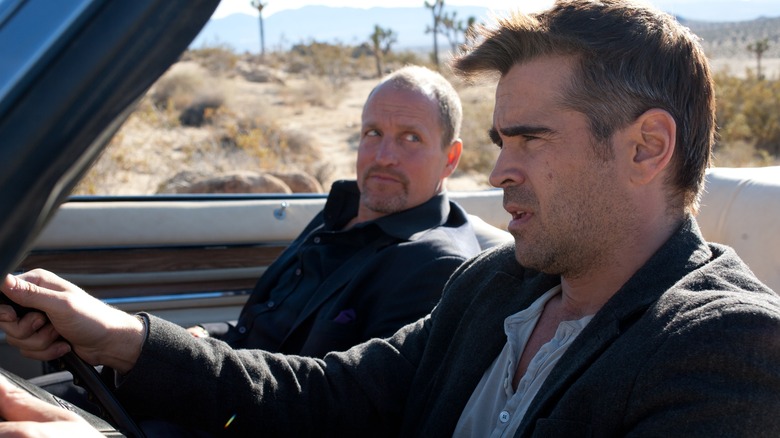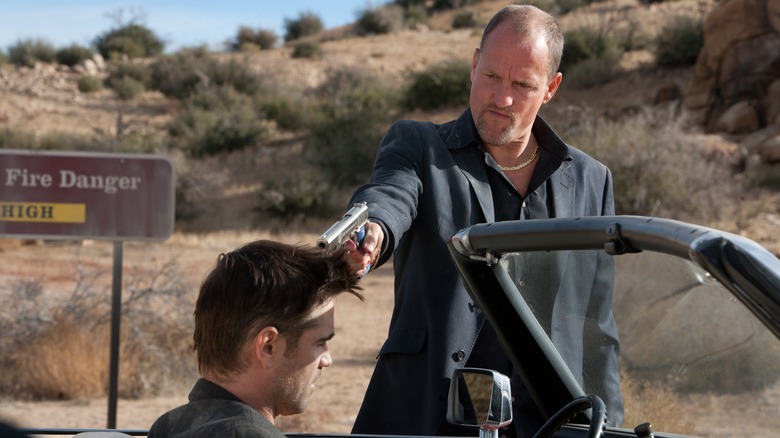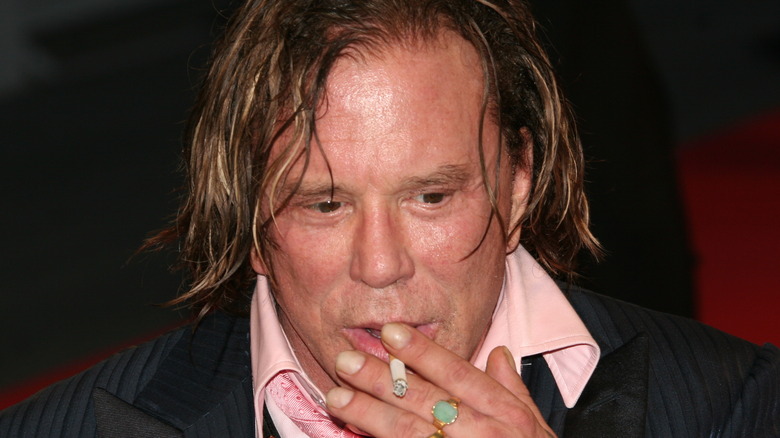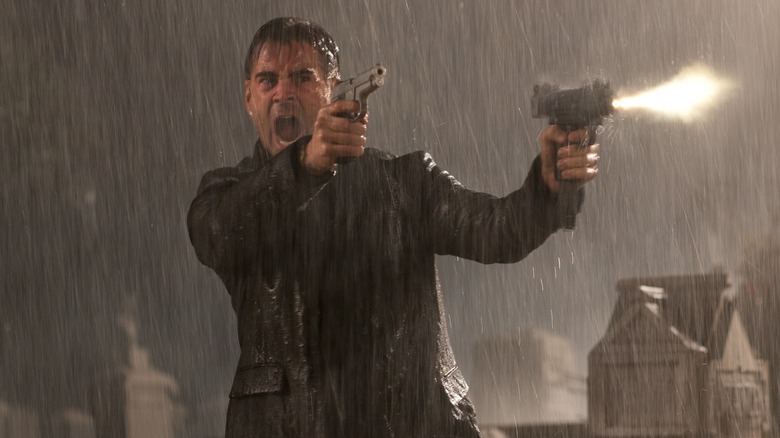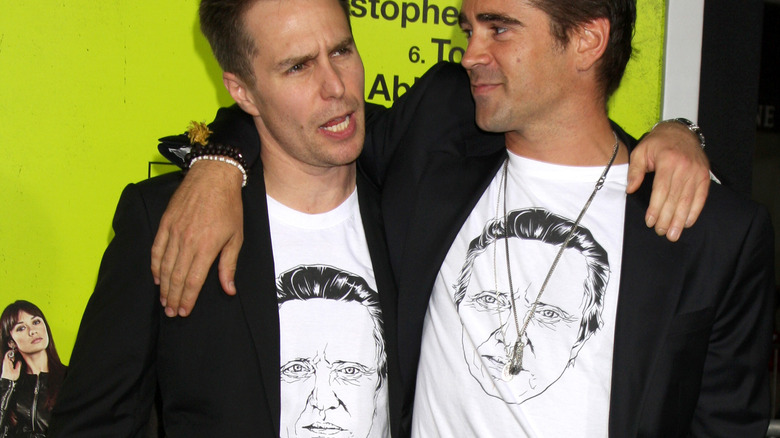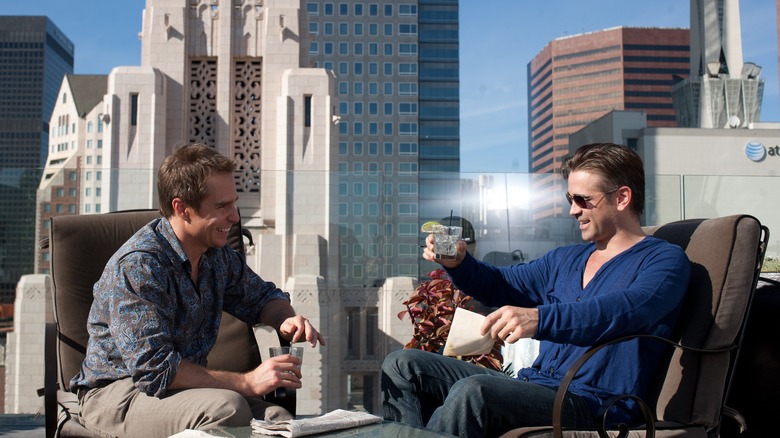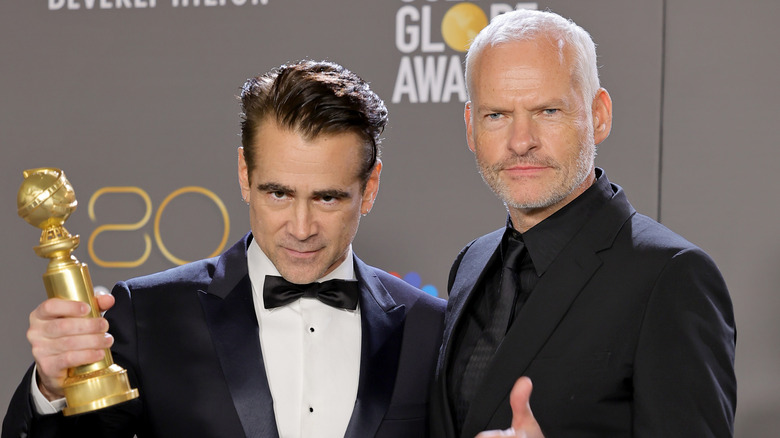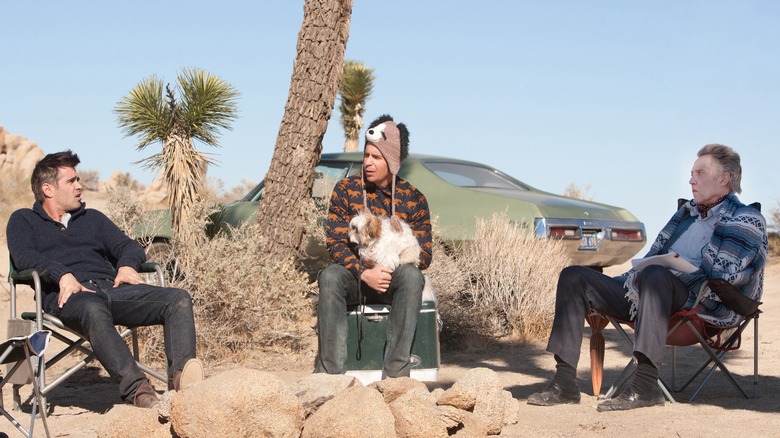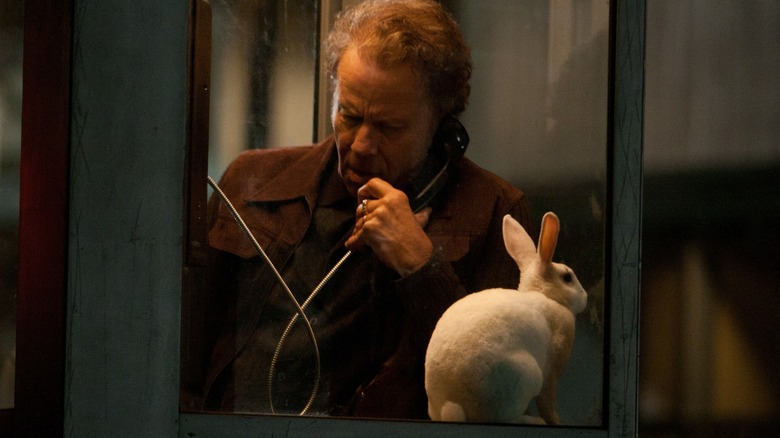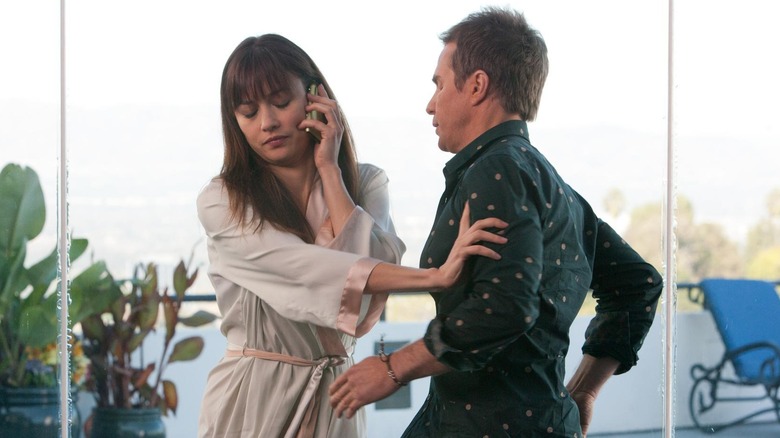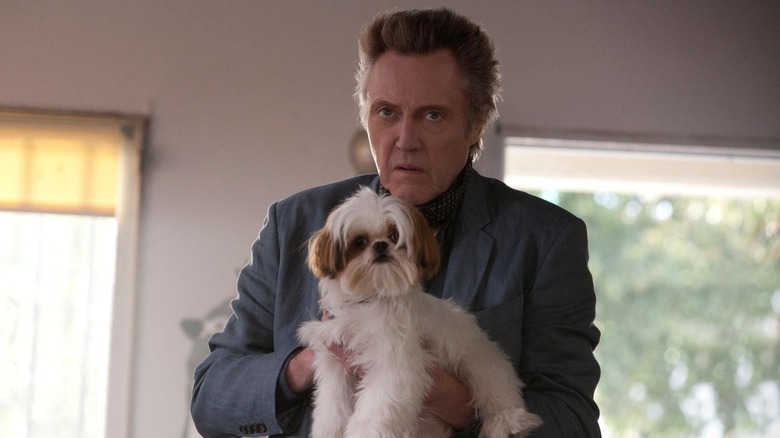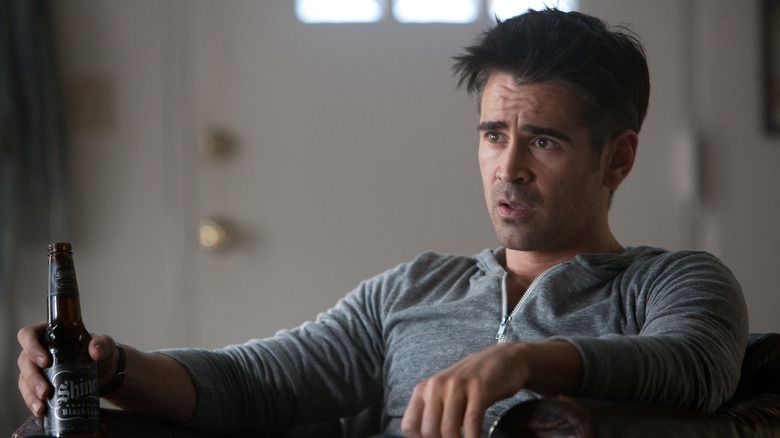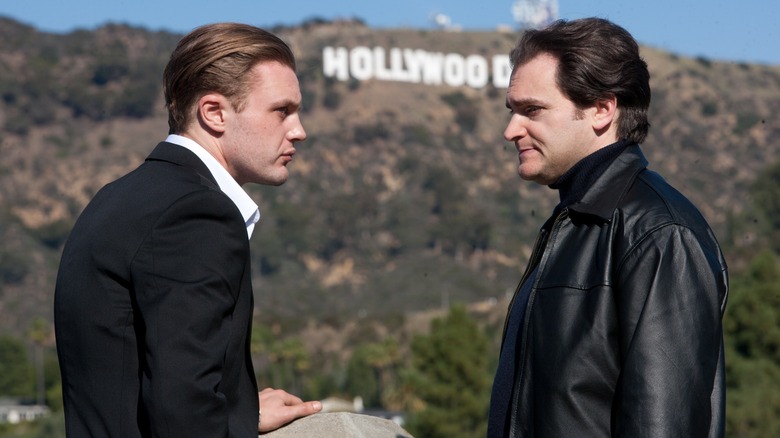12 Facts About Seven Psychopaths Only Big Fans Know About Martin McDonagh's Crime Comedy
Although best avoided in real life, a carefully-placed psychopath can make or break a movie. Hannibal Lecter in "Silence of the Lambs," Patrick Bateman in "American Psycho," Don Logan in "Sexy Beast," Heath Ledger in "The Dark Knight," and of course, Norman Bates in "Psycho" may all be mad, bad, and dangerous to know, but they own the screen and these dark characters hypnotize and captivate the audience with all the fatal magnetism of a black hole. For director Martin McDonagh, one wasn't enough; he went for seven. The resulting 2012 black comedy is all about overkill in every sense of the word, featuring enough charming, disarming, repugnant and troubled characters to generously fill a franchise of films, let alone one.
Although heavily influenced by Quentin Tarantino, "Seven Psychopaths" is very much its own beast. Its dialogue crackles with electricity, and the plot, with its meta-fictional tweaks, is as unpredictable as a barrel of rattlesnakes. On one level, it's a critique of Hollywood and the pretensions of a scriptwriter, but flip the coin and it's just a fiercely entertaining, engaging movie about a bunch of guys from some pretty far-out places. Although at times it may wind and wander off the beaten track, thanks to McDonagh's talent as a writer and director, it never loses its way and the drama always comes thick and fast. Here are a few facts brought in from the cold about the "Seven Psychopaths."
Martin McDonagh wanted to show how horrible violence is
There's a lot of violence in "Seven Psychopaths." People die in all manner of inventive ways. They get shot in the stomach, burned alive, blown up in a car, lynched, and decapitated. Such brutality often comes with the territory when you're making a film featuring a motley gang of deranged and damaged killers. Yet when it arrives, the violence in "Seven Psychopaths" is either satirical or stark, brutal, ugly, and unsettling. The film doesn't shy away from the physical and emotional damage that violence causes. Heads may explode and throats may be slit, but the violence is not glamorized or condemned, it just is. In a 2012 interview with Den of Geek, McDonagh explained that "Seven Psychopaths" is about "showing how nasty and horrible violence is."
"I'm never about gratuity or the fun of violence," the director explained. "I wanted all those bullet hits to be horrible and ugly. Real pain, as violence is."
Chatting with The Scotsman, McDonagh added that he wanted "Seven Psychopaths" to ask questions about Hollywood's long history of glamorizing guys with guns and bad attitudes. To do that, he had to tread a fine line between despair and humor.
"I see the darkness in the world, but I don't want to deal with it in a heavy-handed way," explained McDonagh. "Comedy allows you to question and explore some of those issues without being heavy; it lets you get away with murder."
Mickey Rourke was the original Charlie Costello
As unreconstructed psychopath Charlie Costello, Woody Harrelson brings the same air of menace, bloodthirsty glee, and deranged charisma he conjured up to play Mickey Knox in Oliver Stone's "Natural Born Killers." Costello is a stone-cold killer who is deeply sentimental about his Shih Tzu, Bonny. He is governed by a twisted logic and ruthless code that has him delivering memorable lines such as, "I've had four of my guys killed, and also my girlfriend killed, who I didn't like much, but that's still five friends killed. That's three more friends killed than you've had friends killed." Costello is the psychopath's psychopath, and it's hard to imagine anyone playing him with the sort of unhinged joie de vivre that Harrelson brings to the table.
Yet according to IndieWire, Mickey Rourke was the first in line to play Costello. As a well-known dog lover who is crazy about his pooches, Rourke would appear to have been a natural fit for Costello, and it would seem as though Martin McDonagh thought so as well. But for some unspecified reason, things soured between the director and the notoriously mercurial thespian, and Rourke's loss was Harrelson's gain. Not one to walk away in a dignified silence, Rourke later explained to Moviefone he quit the project because "The director was a jerkoff. He wanted a whole lot for nothing. He can go play with himself."
Rourke got a morbid mention in the movie
Perhaps deciding that revenge is a dish best served cold — or, on the big screen for thousands of people to be titillated by as they munch on their popcorn — McDonagh put an end to whatever feud he had going on with Rourke in an unusual manner. The director placed a little Easter egg in "Seven Psychopaths" that escapes all but the most eagle-eyed viewer. It occurs in the desert scene, when Billy is enthusiastically telling Marty and Hans about his idea for the film's final shootout and the action cuts to the graveyard, where he intends this bloody finale to be set.
If you look closely at the unfolding carnage, you'll notice a headstone that has Rourke's name upon it. When quizzed about this bizarre passing joke at a press conference, McDonagh was said to have grinned like a Cheshire cat. "Yeah," he told CinemaBlend. "We just happened to be filming in a graveyard completely full of Rourkes. You're the first one who has spotted it. That's your scoop."
Rockwell and Farrell wore Christopher Walken shirts to the premiere
If one thing is apparent when watching "Seven Psychopaths," it's the fun the actors appear to be having. Colin Farrell, Sam Rockwell, Christopher Walken, and Woody Harrelson share a natural chemistry that suggests there was a big bromance happening off-set as well as on. This is perhaps why Rockwell and Farrell chose to wear matching shirts featuring a pencil sketch of Walken's face to the "Seven Psychopaths" premiere. According to USA Today, Rockwell and Farrell also wore matching blazers and jeans.
When asked at the premiere how he got under the skin of a psychopath, Walken replied in his unmistakable tones, "I'd be the last to know. I really haven't looked up the word."
Rockwell added: "I think we've been all out of our mind a couple of times. So you can kind of tap into that part of yourself."
According to McDonagh, all the actors took to their psychopathic personalities quite well, but, "Sam Rockwell went pretty out there. He was pretty intriguing." As befitting its darkly comic themes, for the premiere of "Seven Psychopaths, there was a black carpet instead of the more traditional red.
McDonagh wanted to give LA a leading role
In good movies, cities aren't just there to serve as window dressing; they help shape and color the story. In flicks like "Taxi Driver," "City of God," and "Midnight In Paris," the directors take things one step beyond and allow the cities to strut and shine with all the swagger of a lead character. In a 2012 interview, McDonagh said with "Psychopaths" he wanted to do the same thing for Los Angeles he had done for a certain Belgium city with "In Bruges."
"I did want to try to capture an LA on film that was a little different than what has been captured," he said. "I wanted to capture the absence of personality in LA and also the majesty and beauty of the desert too. I wanted to put something serene behind the violence."
Although quick to admit that he had not spent a lot of time in Los Angeles, and lacked the knowledge or experience of a true native, McDonagh felt the LA in "Seven Psychopaths" could have a unique flavor in the context of the film. Farrell added that the powers of will and ambition that Billy and Marty share is pervasive in LA and runs through the city like a current of energy.
"Los Angeles seems like it's constantly in flux," said the actor. "There's probably nowhere in the world with the amount of energy that's put into dreaming in that city. And that's a pretty powerful force."
McDonagh wants to work with Farrell forever
Before "Psychopaths," McDonagh and Farrell had previously collaborated on "In Bruges," tapping into the sort of formidable chemistry that often proves elusive for most directors and actors. As the 2022 Oscar juggernaut "The Banshees of Inisherin" proved once again, McDonagh and Farell (often with help from Brendan Gleeson) push one another to rare, elevated heights.
McDonagh felt the dynamic early on; in 2012, he declared an intention to work with Colin Farrell for the rest of his days. Talking to USA Today at the premiere of "Seven Psychopaths," the director mused, "I think we'll keep working together forever. I think we share the same sort of skewed view of the world and of comedy. We care about the same things."
The admiration is mutual. At the same premiere, Farrell gushed about how much he loves working with his fellow Irishman, saying McDonagh is in a league of his own. "I don't know of anyone theatrically or in film that writes the characters that he writes and puts them into the situations he puts them in, and gives them the beautiful, profane, irreverent, touching, innocent, naive dialogue he gives them," said Farrell.
All three leads are accomplished dancers
Not only sharing a fondness for playing eccentric characters, the three "Psychopaths" leads are also light on their feet.
As a teenager, Farrell was an accomplished line dancer. In a 2012 interview with Conan, Farrell recalled shuffling his feet, sometimes even to a country beat. "I did learn Irish dancing in school, for a couple of years," he said. "I was taught it. I don't know if I learned it, but I was taught it."
Christopher Walken, has a well-documented skill when it comes to dancing, perhaps most famously captured in Fatboy Slim's 2000 "Weapon of Choice" video and the "Let's Misbehave" sequence in the 1981 Steve Martin film "Pennies from Heaven." Before Walken became a name actor, he had a solid background in dance, studying tap and touring in musicals. "I always kind of liked putting on a show," Walken has said of such skills.
Rockwell, once dubbed "the hardest-dancing man in show business," has shown off his moves in multiple films. Rockwell refers to dancing as "hoofing," and says he learned it young as a way to overcome some difficulties growing up.
"It was just the way to meet girls," he recalled in 2019. "I was in a certain crowd at that time and breakdancing was in. I was pretty bad at it, but I did the best I could. Michael Jackson, zippered leather jackets, 'Footloose,' Grandmaster Flash — that's what was big back then."
McDonagh had been a fan of Tom Waits
Out of all the deranged and damaged characters in "Seven Psychopaths," it's perhaps Zachariah Rigby who's the most sinister. The murderer of serial killers, who carries a white bunny rabbit everywhere he goes, is seemingly unaware of the dark shadow he casts. Played in the gruff, amicable style Tom Waits has spent decades perfecting, Zachariah is a true blue psychopath, passing unnoticed and unseen in everyday life and only revealing the fangs when it's already too late. Although overwhelmingly known for his skills as a musician, Waits has been injecting his sizable personality into films since the dawn of the '80s, with memorable supporting work in everything from Francis Ford Coppola films like "The Cotton Club" and "Rumble Fish" to Jim Jarmusch classics like "Down By Law" and "Coffee and Cigarettes" to mainstream fare like "Mystery Men" and "The Book of Eli," indies like "Wristcutters: A Love Story" and most recently, a charismatic turn in Paul Thomas Anderson's "Licorice Pizza."
As far as "Psychopaths" is concerned, landing the talent behind such classics as "Hold On" was a dream come true for McDonagh, who confessed he'd been a fan of Waits since childhood.
"I got Swordfishtrombones when it came out," McDonagh recalled in 2012. "I was 11 or so. He's more than a musician or an actor. He's an idol and an icon of American letters."
Waits reportedly accepted his "Psychopaths" role without even reading the script, intrigued by the concept of playing a serial killer who roams the land clutching a white rabbit. "That's the way it works with those guys," McDonagh said of the musician and similarly-mythical co-star Harry Dean Stanton, who also signed on without a script. "Eastern philosophies and rabbits, not money. That's my new Hollywood."
The studio was more concerned about dogs than women
There's a particularly nasty scene in "Seven Psychopaths" when Billy Bickle unexpectedly shoots Charlie Costello's girlfriend Angela in the stomach, leaving her to bleed out. The scene is made all the more unsettling because he makes out with her just before the killing. In the context of the film, the shooting is partly retaliation for the news that Costello had just shot the cancer-stricken wife of Hans; it's also used to reveal that Bickle is the "Jack of Diamonds killer," for who life is cheap.
In the film, Bickle advises his scriptwriting buddy Marty that "You can't let the animals die in a movie, just the women." In a 2012 interview, McDonagh said that life imitated art.
"There were studio notes about a gun to a dog's head and killing or not killing the dog," he explained. "Not a word about shooting a woman in the stomach."
"That's the way it works," he added. "How many dead animals have you seen in the last year in the movies? And how many dead women have you seen?"
Describing the scene as a little dig at Hollywood, McDonagh has said that when Hans (Walken) tells Marty (Farrell) that "You can't write women for s**t," it was his own way of acknowledging his lack of strong female characters in both "In Bruges" and "Seven Psychopaths." The director explained, "That was sort of my get-out-of-jail-free card. I'm not sure I get away with it. In fact, I don't think I do, but it's fun to at least acknowledge it."
The Shih Tzu is named Bonny in real life
W.C. Fields is credited with coining an old showbiz adage: never work with children or animals; in a film boasting an abundance of psychopaths, however, a well-trained dog is a walk in the park.
When Bonny the Shih Tzu is dognapped, it flips Harelson's Charlie Costello upside down. The trigger-happy gangster vows to destroy those responsible, setting in motion a chain of events that have cataclysmic consequences. Bonny may not have much dialogue, but she's a central part of the plot — and had little difficulty responding to the actors, since she's also named Bonny in real life.
A 2012 People report on the two-year-old canine's first bite of the acting cherry portrayed her as a natural. "Bonny is a sweet, funny and very special little dog," said her trainer, Claire Dore, at the film's premiere. "Her ability to tune out much of what is going on around her is a great asset for working in an action-heavy film."
On screen, Bonny's inherent cuteness appears to win over any psychopath who crosses her path; behind the scenes, she similarly proved a big hit with the cast. Walken was particularly taken with her. The actor who once worked as a lion tamer told Vanity Fair Bonny was,
"The sweetest dog," Walken said of his co-star. "What a good-natured dog... I had a lot to do with her in the movie and the dog was just kind of an angel."
McDonagh doesn't believe in writer's block
In "Seven Psychopaths," alcoholic wordsmith Marty grapples with an unwritten script and the existential dilemma of trying to create seven believable psychopaths, as well as a plausible plot to tie it all together. When the huge boulder blocking the well of inspiration finally begins to roll, ideas pour out, and he's washed away into a place where reality and imagination collide. In real life, however, McDonagh is unfamiliar with the curse of writer's block.
When asked in an interview with BFI if the four-year gap between "In Bruges" and "Seven Psychopaths" was partly due to writer's block, McDonagh replied, "I don't even subscribe to writer's block being a truthful thing."
Like most writers, McDonagh admits he can be quite lazy about actually getting himself positioned in the chair and committing himself to the task of creating something out of nothing. He believes finding something to write about is more about, "Sitting down and facing down the blank page and doing it, and I've always been ok at that," he explained. Sometimes, it's not fun."
Is Psychopaths commenting on In Bruges?
McDonagh's 2008 debut film "In Bruges" focused on Irish hitman Ray (Farrell) and Ken (Gleeson), sent to the Belgium capital to hide out; the two assassins are like chalk and cheese, riffing off one another's differences with dialogue that snaps, crackles, and pops with the effortless ease of two friends who have spent a lot of time in one another's company. The very first scene in "American Psychopaths" is something of a spirit animal, featuring two American assassins (similar to their Irish counterparts) sharing the same sort of bizarrely morbid conversation about killing people. Less than three minutes into "Seven Psychopaths," however, the "Jack of Diamonds killer" dispatches both tough guys.
The two hitmen appear completely unnecessary to the plot, but when McDonagh was asked about it, he denied that the opening was an "In Bruges" joke.
"I wish," he laughed. "Maybe, it should have been Colin and Brandon in the first scene."
McDonagh added that, despite appearances, any similarities between "Bruges" and "Psychopaths" is purely coincidental. "I don't think anything about the story of this is reacting to 'In Bruges' or the violence therein," said the filmmaker. "I've always wanted to explore that kind of struggle that a writer has, especially someone who writes dark or violent stuff."
